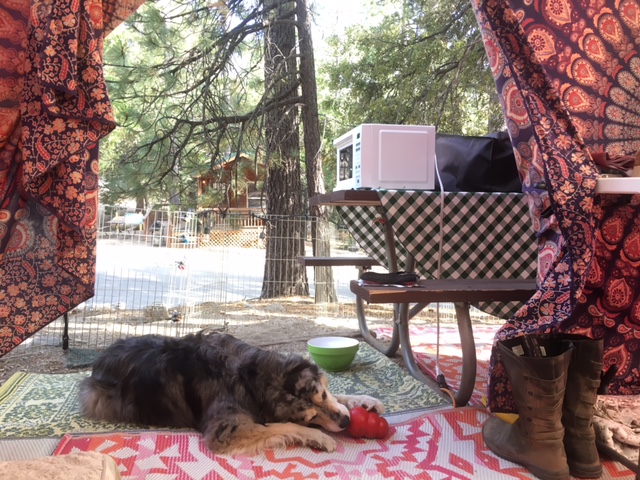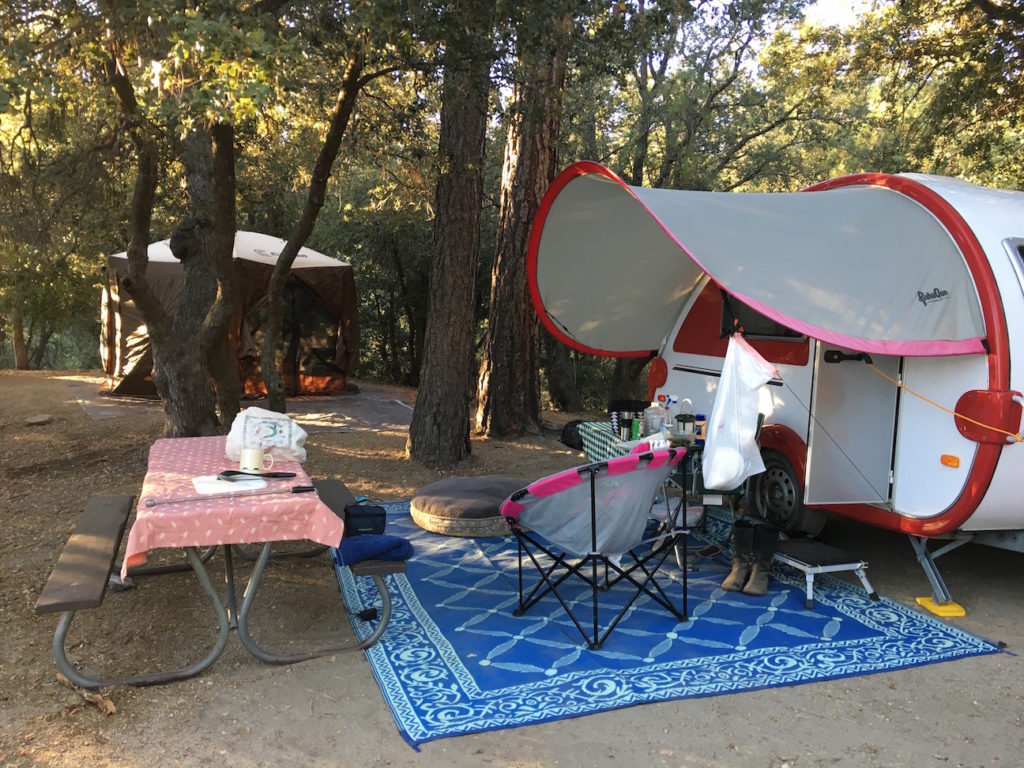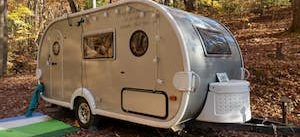
In the Thousand Trails network, you do not have a certain campsite reserved where you arrive at the campground. You simply choose any open campsite when you arrive. And that will be your home for as long as you will be there, from one day to three weeks. There are many considerations for which site to choose. Among them is: “How big? How small?”
Unless you frequent campgrounds, you may not know that there are varying sizes of campsites. Some are very small. Some large. Some wide or narrow. Some long or short. There may be campgrounds where every site is identical, but those are parking lot type campgrounds on very flat parcels. In nature, in the mountains, the campground follows the lay of the land.
For me, the size of the campsite is not at the top of my list of priorities. Because I have just about the smallest trailer anyone could have, pretty much all the RV campsites available will be big enough for me. That is not true for people who have the biggest rigs made. When people are driving a 45-ft. motorhome, or towing a 40-ft. Fifth Wheel trailer, finding a big enough campsite is usually at the top of their list. Many questions on the Thousand Trails Facebook groups I read go like this: “We have a 45-ft. motorhome and want to go to XX campground. Will there be sites big enough for us?” Others will either encourage or discourage these campers from trying out that campground. Some campgrounds are hilly with narrow roads and lots of trees. Some are flat with wide roads and no trees. The latter is easy for the big rigs; the former is very challenging.
Many campgrounds were built many decades ago when a 30-ft. motorhome was considered jumbo sized. These campgrounds were not built for bigger rigs. Many state and federal campground limit the size of rigs that can camp there. Some rigs are so tall they cannot fit under certain bridges and need to use a GPS designed for truckers.

I hope that when people are in the market for a trailer or motorhome, they think ahead to the potential problems they will have with a bigger rig. At least if they are informed, and if they decide to go really big, they are less likely to blame the campground, the roads, other campers for their misery. They will know they made that choice. Of course, some who have the biggest motorhomes or trailers allowed by law usually have no troubles. They pick the campgrounds with big enough sites, and are expert drivers and can park anything in any spot no matter how many trees or other obstacles are around. If you are one of those, don’t worry, be happy. But the rest of us have to think ahead.
My current campsite is very small. There is just enough room for my trailer, the awning, my vehicle, and the picnic table. Normally a small site means that you have neighbors that are too close. But not here. It’s actually perfect. I’m on a south-facing slope, with a little hill behind me. So it feels very cozy. There’s a big tree on the site for shade, but also plenty of sun. I have had no neighbors because a new yurt is being built next to me and is not yet rented.
I ended up in my lovely little site because when I arrived (my first time here) I told the ranger at the front gate that I was nervous about choosing a site, and I asked if she could recommend one. She saw that I was towing The Tiny, so she circled a few smaller sites on the map. If she can get me to take a smaller site, that would leave the bigger sites for the bigger rigs that will be coming in behind me. In nearly empty campgrounds, or in the off season, there will be plenty of sites to go around. But with a big holiday coming up at the peak of the camping season, and with the campground fully booked for the holiday, getting the right rig into the right site is paramount.
The ranger sold me on the assets of this little site, with its privacy and sunny location, which is important in this part of the country, which can get foggy and gloomy. After driving around the section she recommended, I chose the small site.
The site required that I back The Tiny up onto the little hill. I had never backed up onto such a sloped site. She assured me it would be level on top and it was. So I got positioned and started backing up. I had a hard time seeing where I was going and got disoriented. There were two young construction guys working at the yurt next door, but I didn’t let that worry me. I have been schooled from the beginning of this journey not to worry about anyone watching me back up. Just focus on what I’m doing. That has been good advice. So I backed up, got out to look, got back in, pulled forward, backed up, got out to look, got back in, pulled forward, backed up, and on and on and on. I literally went forward and backward at least 12 times before I got The Tiny exactly where I wanted it on the level site, in relation to the power pole and the position on the site.

Tomorrow, after two weeks here, I leave for another Thousand Trails campground that is new to me. I like it better when I’m going to a campground that I’ve been to many times before so I know what to expect. But as I have 160 campgrounds and RV parks that I can choose from, and I don’t want to stay in a little circle of safety and never really see the country, it makes sense that I’ll be going to a good number of campgrounds for the first time. My goal is to always ask the ranger for advice. I think it helps to preface my request by saying that I’m nervous about finding a site. That might help them help me more. Of course, if I’m staying just overnight on the way to a destination, none of this matter that much. Just about any old site will do. But for a two-week or three-week stay, the site is very important.
As I prepare to leave this little spot of paradise, I have that familiar regret that I’ll never find another campsite so perfect for me. I fear that this has been the pinnacle of my campsite selection success, and it will all be downhill from here on. But if I have felt this before, doesn’t that mean I’ve had other perfect campsites? And doesn’t that suggest there will be more perfect campsites in my future? I do hope the knowledge that I’m getting pretty good at picking campsites starts to sink in. I’d like to approach each campground, either new or familiar to me, with a calm knowingness that I will find a campsite perfect for me. And even if I don’t, there will be another campsite to choose in the very near future.
